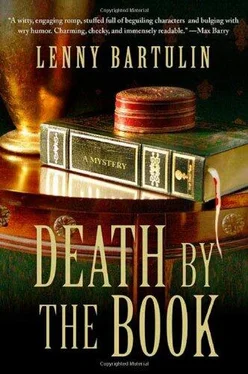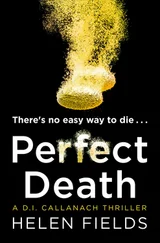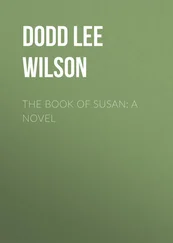“But why would she accuse —”
“I don’t know! Why would I know?”
She chewed her bottom lip. Jack wished he could apply for the job. For some reason there was now only thirty centimetres between them. And closing? Maybe it was the alignment of the stars. He flicked his cigarette away behind him.
Annabelle looked up into his eyes. Tension slipped from her face. Her features softened. “You’ve got no idea what I’ve been through with this family,” she said, her voice sounding sorry for her, if nobody else was. “No idea at all.”
“Maybe you should tell me about it.”
“Maybe I should.”
“I’m a good listener.”
“So why don’t you shut up.”
Two seconds later, Annabelle Kasprowicz had her arms around him. Jack watched her lips travel towards him in slow motion through time and space, slightly open, promising death by softness. He held her to him and obliged with an opposite and equal reaction. They kissed. Jack stopped thinking. All was well in the world.
Sometimes a minute can be a long time. You can even forget where you are in one good, long minute. Then a voice from the kitchen reminded Jack exactly where he was.
“Hi Mum.”
Annabelle pushed herself away from Jack as though he had caught fire.
“Louisa, what are you doing home?” She stepped back into the kitchen. Her daughter stared at Jack. If there had been a cigarette in his mouth, her eyes would have lit it. His eyebrows might have gone up, too.
“Nina got upset with her mother and took off.”
“Who brought you over?”
“I called Dad. He’s in the car. We’re going out for food.”
Annabelle glanced at Jack. “Louisa was at a wedding rehearsal. She’s a bridesmaid for her cousin.”
Jack nodded. He was imagining himself punching Durst through his car window. He walked back into the kitchen, closing the patio door behind him.
“I remember you,” said Louisa. She tilted her head to the right, the stern look was replaced with a smirk. “You’re the gas man.”
“The best in the business.”
“He’s cute, Mum. Nice shoulders.”
“Don’t be smart.”
Louisa crossed her arms. “When are you going to introduce him to Dad?”
“We’ve already met,” said Jack. He was glad he was no longer a nineteen-year-old, hormones surging, confused, loud, fragile. Girls like Louisa had always eaten poor bastards like that for breakfast.
“Oh, good. Then you can say hello.” She smiled at Jack, then winked at her mother.
“That’s enough, Louisa.”
“I’ll just go get him.” She walked out of the kitchen and down the hall.
“You might have to set another place,” said Jack, bristling.
“This isn’t funny.” Annabelle walked over and picked up her glass from the dining table and drank: but wine was the wrong drink. It was not for going down quickly. She coughed. “She won’t bring him in.”
“Maybe he’s hungry.”
“She won’t bring him in.”
The extraction fan whined. Jack strained his ears, listening for the front door, for footsteps down the hall. Annabelle was listening, too. A minute later, they both heard them.
Here he comes . Jack dropped his right hand to his side and flexed his fingers. His heart beat hard in his chest. He had never thumped a middle-aged metrosexual before.
Hammond Kasprowicz was far from marxist, but he strode into the kitchen like a politburo minister of the former Union of Soviet Socialist Republics. His face was flushed and sweaty: under the whiteness of his hair, his colour reminded Jack of a hot saveloy. He was dressed in a charcoal grey suit, white shirt, and a broad, pale yellow tie. There was a black leather briefcase in his hand. He dropped it onto the floor beside the island bench and immediately began tugging at the Windsor knot around his neck.
“You should teach your daughter some manners.”
He said it without looking at Annabelle at all. His voice was gruff, but tired. He removed his jacket, then checked the pockets before throwing it onto a stool.
Annabelle walked over to the dinner table and sat down. Jack stood looking at Kasprowicz, wondering when the old man was going to acknowledge his presence.
“I thought you were flying back tomorrow night,” said Annabelle.
Kasprowicz grunted. “Obviously.” He opened a cupboard door and removed a bottle of Scotch. “Are you well, Mr Susko?”
“Any better I’d burst. Yourself?”
No reply. Kasprowicz hunched his broad, round back over the bottle and cracked the cap.
“Sit down, Jack.” Annabelle motioned to his chair.
“Yes.” Kasprowicz poured himself three fat fingers of Scotch. “Please, don’t let me disturb your dinner.” He held onto the edge of the granite bench-top, tilted his head back and threw half the Scotch down his throat.
“You’re a smooth operator, Susko,” he said, his back still to them. “One minute you’re knee-deep in smelly old books, the next you’re in my kitchen, enjoying a meal with my daughter.” He brought the glass up to his mouth again. “I can only hope you’ve applied yourself as tenaciously to my little job.”
Jack grinned. Kasprowicz was quick: he might be old, but his brain ticked over like it had been engineered in Stuttgart. “I’m giving it my full attention, Hammond. I didn’t know you were such a fan of your brother’s work.”
Hammond Kasprowicz turned around. “So you know.” He sipped his drink and glanced at his daughter. She had her back to him but shifted in her seat under his gaze. “That’s almost impressive. Maybe I’ll have to find more jobs for you.” He rubbed his chin and pulled at his tie some more. “Though I worry about your confidentiality.”
Jack smiled. He could have cut the nonchalance with a chainsaw. “I worry about your disclosure,” he replied.
Glass in hand, Kasprowicz picked his briefcase up from the floor. “Some things just aren’t your business, Mr Susko. You have your job and you’ve been paid.” Kasprowicz rolled his shoulders. “When can I expect a delivery? Have you had much success?”
“Moderate. But competition doesn’t help.”
Kasprowicz’s brows angled down and shadowed his eyes like furry awnings. He seemed genuinely surprised. “Competition?”
Jack nodded. “That’s right.”
Kasprowicz stared thoughtfully at his glass of Scotch. Jack waited, watching him.
Annabelle broke the silence “Why are you after Edward’s books?”
Kasprowicz frowned like a High Court judge. “And why would that be any of your concern?”
“Not so much my concern,” said Annabelle. “Rather Celia Mitten’s.”
“What are you talking about?”
Annabelle turned to look at her father. Kasprowicz pushed his chin out.
“Are you burning Edward’s books?” she said, a little stronger than matter-of-factly. “Is that why you’ve got Jack searching for them? So that you can burn them, put the ashes in a box and send them to a sick old man?”
Kasprowicz shook his head, disappointed and annoyed, as though Annabelle had just told him she was pregnant by the gardener. “You’ve been drinking,” he said. The man was a Fourth-Dan Black Belt in the delivery of contempt. “Who told you this nonsense?”
Annabelle stood up, determined. She knew she had already gone too far. Even the pot plants knew it. “Are you burning Edward’s books?” she repeated.
“You might want to lose the tone.”
“Then why else would you want them?”
Hammond Kasprowicz looked at Jack and then back at his daughter. His face was as hard as the bust of a Roman emperor. He did not care that the risotto was getting cold. “It’s not your business,” he said. That was it. Question time was over. He picked up his jacket, turned and walked out of the kitchen. His footsteps were loud but unhurried down the hall.
Читать дальше












